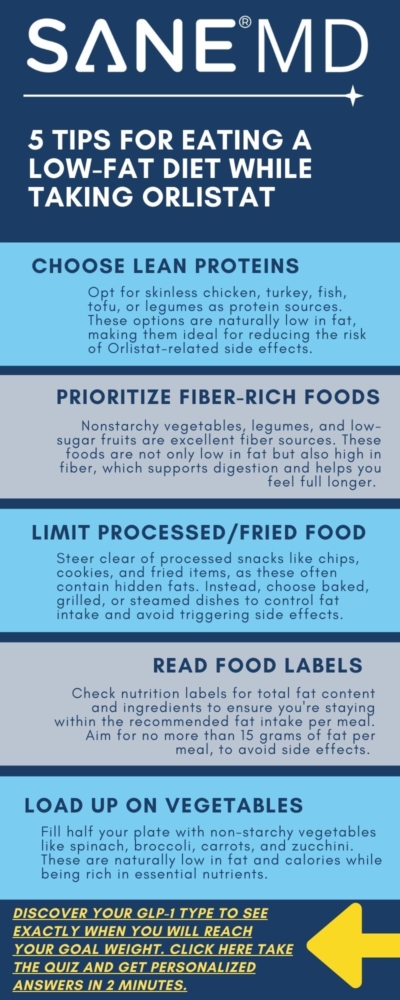Quiz: Is Orlistat the Right Weight Loss Aid for You?
Dr. Matthew Olesiak, MD, is the Chief Medical Director at SANESolution, a renowned wellness technology company dedicated to providing evidence-based solutions for optimal living. Dr. Olesiak earned his medical degree from the prestigious Jagiellonian University Medical College in Kraków, Poland, where he developed a strong foundation in medicine.
Is Orlistat the right weight loss aid for you? Should you choose it for your weight loss journey? Read on to find out!
Orlistat is a medication designed to assist with weight loss by targeting fat absorption in the digestive system. It has been widely used to support individuals with overweight or obesity who struggle to lose body weight through diet and exercise alone.
Available both over-the-counter (OTC) and by prescription, Orlistat offers a structured approach to weight management when combined with lifestyle changes.
For those curious if Orlistat might suit their needs or possibly considering it’s alternatives, the weight loss drug type quiz provides a helpful starting point. This interactive tool guides users in evaluating whether Orlistat aligns with their weight loss goals.
Before diving into the details, here are the key points about Orlistat.
Key Takeaways
- Blocks Fat Absorption: Orlistat inhibits fat-digesting enzymes, aiding weight loss.
- Requires Lifestyle Changes: Best results occur with a low-fat diet and regular exercise.
- Available Options: Offered both OTC (Alli) and by prescription, though side effects can occur.
What is Orlistat?
Orlistat is a weight loss medication that works by reducing fat absorption in the digestive tract. It is intended for adults with a body mass index (BMI) of 27 or higher who also have related conditions like high blood pressure or diabetes, or for those with a BMI of 30 or higher without other conditions. It is important to consult a health care professional before starting Orlistat to ensure it is appropriate for your health condition.
Available in two forms, Orlistat can be purchased as a lower-dose OTC medication under the brand name Alli or as a higher-dose prescription medication. Regardless of the form, Orlistat must be paired with dietary changes and regular exercise to achieve meaningful results. Additionally, users should be aware of the potential risk of serious liver injury and monitor their liver health during treatment.
While useful, Orlistat is not a standalone solution. It is meant to supplement, not replace, a healthy lifestyle.
Is Orlistat the Right Weight Loss Aid for You? How Orlistat Works
Orlistat’s mechanism of action revolves around blocking the enzyme lipase, which breaks down dietary fat in the digestive tract. By inhibiting lipase, Orlistat prevents roughly 30% of the fat consumed from being absorbed. Instead, this undigested fat is excreted through the stool, leading to changes in bowel movement.
This process leads to a calorie deficit, which is essential for weight loss. Additionally, Orlistat supports long-term weight maintenance by helping individuals sustain a reduced-calorie diet. By lowering fat absorption, the medication also reduces the risk of obesity-related health conditions, such as type 2 diabetes, high blood pressure, and heart disease.
Benefits of Orlistat for Weight Loss
Orlistat offers several key benefits:
- Weight Loss and Maintenance: It assists in shedding pounds and maintaining a lower weight over time.
- Improved Health Metrics: Users often see better BMI scores and reduced risks of weight-related conditions like diabetes and hypertension.
- Enhanced Well-Being: Combined with a balanced diet and exercise, Orlistat promotes better overall health and vitality.
For individuals committed to making lasting lifestyle changes, Orlistat can provide an additional layer of support on their weight loss journey.
Orlistat Dosage and Administration
The dosage of Orlistat depends on whether it is taken as a prescription medication (120 mg) or as an OTC option (60 mg). Typically, it is taken three times a day with meals containing fat.
Here are some important guidelines:
- If a meal contains no fat, Orlistat is unnecessary.
- Dosages should not exceed the recommended amount to avoid side effects.
- Users should follow their healthcare provider’s instructions closely.
- If you miss a dose, take it as soon as you remember unless it has been over one hour since your last meal. In that case, skip the missed dose and do not double up on your next dose.
Consistency in dosage and adherence to a low-fat diet are crucial for achieving desired results.
Side Effects and Precautions
Orlistat may cause side effects, particularly in the digestive system. Common issues include:
- Stomach discomfort or pain.
- Oily stools or increased bowel movements.
- Flatulence with oily discharge.
While these effects are often mild, serious complications like liver injury or kidney stones may occur in rare cases. If users notice any unusual symptoms, such as jaundice or severe abdominal pain, they should seek medical attention immediately. In rare cases, users may experience leaky bowel movements, which should be reported to a healthcare professional immediately.
Drug Interactions with Other Medications
Orlistat can interact with certain medications, including:
- Cyclosporine: May require dose adjustments.
- Levothyroxine: Could interfere with thyroid hormone absorption.
- Fat-Soluble Vitamins (A, D, E, K): Absorption may decrease, necessitating supplementation.
Orlistat can have drug interactions with other medications, so it is crucial to tell your doctor about all the medications and supplements you are taking.
To avoid potential complications, it’s essential to inform healthcare providers about all medications and supplements being taken.
Tips for a Successful Low-Fat Diet
To maximize the benefits of Orlistat and minimize side effects, users should aim for a diet where fat comprises no more than 30% of total daily calories.
Key recommendations include:
- Choosing lean protein sources, such as chicken or fish.
- Incorporating plenty of fruits, vegetables, and legumes.
- Avoiding high-fat meals, which can exacerbate gastrointestinal side effects.
Taking a daily multivitamin can also help compensate for any nutrient absorption issues caused by Orlistat.
Alternatives to Orlistat for Weight Loss
If you’re considering Orlistat for weight loss, it’s essential to explore alternative options as well.
Here are some other medications and methods that can help with weight loss:
- Qsymia: This prescription medication combines phentermine and topiramate to aid weight loss. It’s approved for adults with a body mass index (BMI) of 30 or higher, or those with a BMI of 27 or higher with at least one weight-related condition, such as high blood pressure or diabetes.
- Belviq: Belviq works by activating a serotonin receptor in the brain, which helps reduce hunger and increase feelings of fullness. It’s suitable for adults with a BMI of 30 or higher, or those with a BMI of 27 or higher with at least one weight-related condition.
- Contrave: This medication combines bupropion and naltrexone to support weight loss. It’s intended for adults with a BMI of 30 or higher, or those with a BMI of 27 or higher with at least one weight-related condition.
- Saxenda: Containing liraglutide, Saxenda helps reduce hunger and increase feelings of fullness. It’s approved for adults with a BMI of 30 or higher, or those with a BMI of 27 or higher with at least one weight-related condition.
- Low-Fat Diet and Exercise: A sustainable approach to weight loss involves reducing daily fat intake to 30% or less and engaging in regular physical activity. This method can be combined with Orlistat or other weight loss medications for enhanced results.
- Bariatric Surgery: For individuals with a BMI of 40 or higher, or those with a BMI of 35 or higher with at least one weight-related condition, bariatric surgery can offer significant weight loss.
It’s essential to consult with a healthcare professional before starting any weight loss program or medication. They can help you determine the best approach for your individual needs and health status.
Cost and Savings
Orlistat’s cost varies depending on the form (OTC or prescription) and the pharmacy. Discounts and coupons can help reduce the price. Programs like GoodRx enable users to compare costs and find the best savings.
For those managing long-term weight loss plans, understanding these options can make Orlistat more affordable and accessible.
FAQ Section: Common Questions About Orlistat
Orlistat is a widely used weight loss medication, but understanding how it works and whether it’s right for you is essential.
Below are answers to some frequently asked questions about Orlistat. It is always recommended to consult healthcare professionals for personalized advice and guidance.
1. How does Orlistat work to block fat?
Orlistat inhibits lipase, an enzyme responsible for breaking down dietary fats in the digestive tract. By blocking lipase, about 30% of the fat consumed remains undigested and is excreted in the stool.
This process reduces calorie absorption and supports weight loss when combined with dietary and lifestyle changes.
2. What are the most common side effects of Orlistat?
The most frequently reported side effects include oily stools, increased bowel movements, and flatulence with discharge. These effects are typically a result of undigested fat passing through the digestive system.
While often mild, these symptoms can be minimized by following a low-fat diet while taking Orlistat.
3. Who should avoid using Orlistat?
Orlistat is not suitable for everyone. It should be avoided by individuals with chronic malabsorption syndrome, gallbladder problems, or allergies to any components of the medication.
Pregnant or breastfeeding women should also avoid Orlistat, as weight loss is not recommended during these periods.
4. Can I take Orlistat while on other medications?
Orlistat may interact with medications such as cyclosporine or levothyroxine, potentially reducing their effectiveness. It can also interfere with the absorption of fat-soluble vitamins.
Consulting a healthcare provider before starting Orlistat is crucial to avoid harmful interactions.
5. Is Orlistat effective for long-term weight loss?
Yes, Orlistat can support long-term weight loss when combined with a calorie-controlled diet and regular exercise.
Many users report sustained weight loss and improvements in overall health metrics, such as BMI and blood pressure, with continued use.
Conclusion
Orlistat offers an evidence-based approach to weight loss by blocking fat absorption and supporting healthier lifestyle habits. While it is not a standalone solution, it can complement a low-fat diet and exercise regimen to help individuals achieve and maintain their weight loss goals.
If you’re considering Orlistat, taking the weight loss drug type quiz can help determine whether it aligns with your unique needs and goals.





